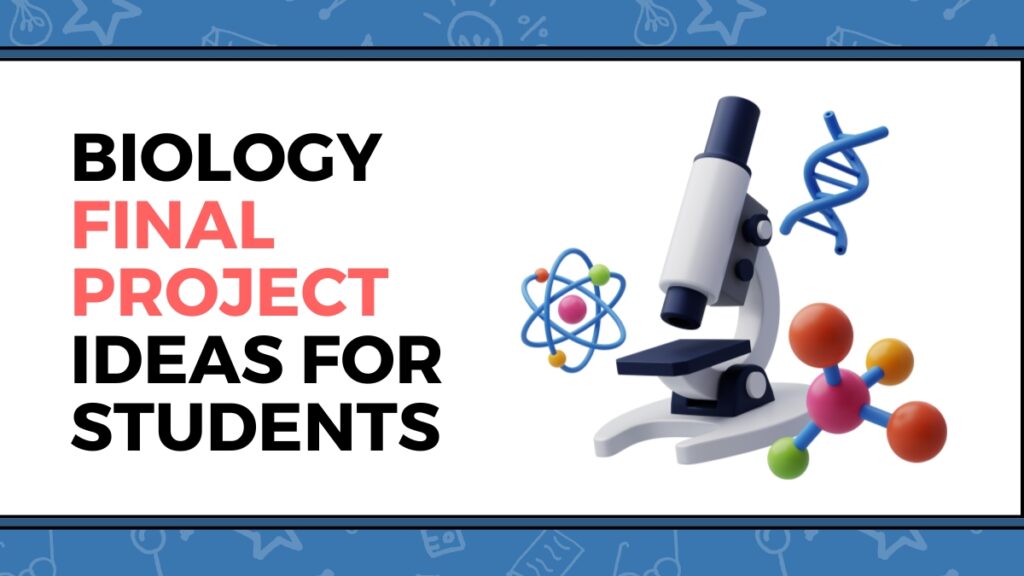Discover creative and exciting biology final project ideas for students. From exploring the human body to studying nature and microorganisms, find inspiration and tips to make your project stand out.
Biology is all about life, and your final project is a chance to explore something you love. Whether you’re curious about the human body, nature, or tiny organisms, this project can be both fun and interesting.
In this blog, we’ll share cool project ideas and tips to help you pick something that excites you and meets your school goals.
Let’s jump into this adventure together!
Importance of Biology Final Projects
Biology final projects help students to:
- Explore Topics: Dive deeper into a biological concept.
- Build Skills: Learn research and analysis.
- Think Critically: Solve real-world problems.
- Be Creative: Develop new ideas.
- Communicate: Present findings clearly.
- Gain Confidence: Experience independent research.
These projects prepare students for future academic and career success.
Biology Final Project Ideas for Students PDF
Biology Final Project Ideas for Students
Check out biology final project ideas for students:-
Human Biology
- Genetic Traits
- Study family traits like eye color.
- Explore inheritance patterns for blood type.
- Diet and Health
- Analyze effects of various diets on cholesterol.
- Measure overall health changes due to diet.
- Exercise Effects
- Study heart rate changes from different exercises.
- Evaluate muscle strength improvements.
- Immune Response
- Examine impact of vaccines on immunity.
- Compare responses to different vaccines.
- Anatomy Model
- Create a 3D model of the digestive system.
- Detail functions of each organ in the model.
- Sleep and Cognition
- Investigate memory effects of sleep deprivation.
- Measure changes in concentration with less sleep.
- Genetic Disorders
- Study conditions like cystic fibrosis.
- Explore genetic and environmental factors.
- Supplements Impact
- Evaluate health markers affected by supplements.
- Compare effectiveness of common dietary supplements.
- Microbiome
- Analyze diversity in gut microbiota.
- Compare microbiomes across different individuals.
- Sensory Perception
- Study effects of sensory deprivation on perception.
- Examine cognitive function changes with sensory loss.
Plant Biology
- Biofuel Efficiency
- Compare biofuel yields from different plants.
- Assess production efficiency.
- Plant Adaptations
- Study water conservation in desert plants.
- Examine physical and biochemical adaptations.
- Photosynthesis Rate
- Test how light intensity affects photosynthesis.
- Experiment with other variables like CO2 levels.
- Hormone Effects
- Investigate plant hormone impacts on growth.
- Study developmental changes with hormone treatments.
- GMO Impact
- Examine GM crops’ effects on ecosystems.
- Analyze benefits and risks to local flora and fauna.
- Seed Germination
- Study how temperature affects germination rates.
- Investigate the role of light in seed development.
- Disease Resistance
- Test plant varieties for resistance to common diseases.
- Analyze genetic factors in resistance.
- Pollinator Preferences
- Identify plants that attract specific pollinators.
- Study flower characteristics influencing pollinator attraction.
- Hydroponics vs. Soil
- Compare plant growth in hydroponic vs. soil systems.
- Evaluate nutrient absorption differences.
- Plant Stress Response
- Study how drought affects plant health.
- Investigate responses to high salinity.
Animal Biology
- Behavioral Observations
- Record behaviors of a specific animal species.
- Analyze behavior patterns and social interactions.
- Conservation Efforts
- Evaluate effectiveness of local wildlife conservation.
- Assess impact on endangered species.
- Animal Adaptations
- Study how animals adapt to their environments.
- Investigate physical and behavioral adaptations.
- Zoological Classification
- Create a guide for animal classification.
- Categorize animals based on characteristics.
- Animal Communication
- Investigate vocalizations and body language.
- Study communication methods within species.
- Habitat Preservation
- Develop strategies for preserving endangered habitats.
- Assess impact of preservation efforts.
- Comparative Anatomy
- Compare mammal, bird, and reptile anatomy.
- Identify similarities and differences.
- Predator-Prey Dynamics
- Study interactions between predators and prey.
- Analyze population effects on each species.
- Migration Patterns
- Track migration routes of specific animals.
- Analyze patterns and changes over time.
- Behavioral Enrichment
- Design enrichment activities for captive animals.
- Assess impacts on animal well-being.
Ecology and Environmental Science
- Biodiversity Survey
- Conduct a survey of local ecosystem diversity.
- Record species present and their abundance.
- Pollution Impact
- Investigate effects of pollution on local wildlife.
- Measure changes in health and behavior.
- Climate Change Effects
- Study how climate change impacts local flora and fauna.
- Assess changes in ecosystem dynamics.
- Renewable Energy
- Evaluate effectiveness of different biofuels.
- Compare renewable energy sources like solar and wind.
- Invasive Species
- Examine effects of invasive species on ecosystems.
- Study impacts on native species and habitat.
- Conservation Strategies
- Develop plans for local species or habitat conservation.
- Implement and assess conservation actions.
- Wetland Health
- Assess health of wetland ecosystems.
- Monitor water quality and biodiversity.
- Urban Green Spaces
- Investigate benefits of green spaces in cities.
- Analyze impacts on local biodiversity and human well-being.
- Ecosystem Services
- Study services like pollination provided by habitats.
- Evaluate importance for ecosystem functioning.
- Soil Health
- Examine effects of farming practices on soil.
- Study soil quality and nutrient levels.
Microbiology
- Antibiotic Resistance
- Investigate prevalence of resistant bacteria.
- Study environmental and clinical sources.
- Food Spoilage
- Analyze role of microorganisms in food spoilage.
- Explore preservation methods.
- Water Quality
- Test local water for microbial contamination.
- Evaluate treatment methods and safety.
- Biotechnology
- Explore microorganisms in industrial applications.
- Study production of enzymes or pharmaceuticals.
- Microbial Fuel Cells
- Experiment with fuel cells to generate electricity.
- Use waste materials as a power source.
- Pathogen Detection
- Develop methods to detect pathogens in food and water.
- Improve detection accuracy and speed.
- Bioremediation
- Study microorganisms used for environmental cleanup.
- Evaluate effectiveness in removing pollutants.
- Probiotics Effectiveness
- Investigate impact of probiotics on gut health.
- Study effects on immune function.
- Soil Microbes
- Analyze microbial diversity in different soils.
- Compare microbial communities across locations.
- Biofilm Formation
- Study formation of biofilms in various environments.
- Investigate their impact on health and industry.
Cellular Biology
- Cell Structure
- Create models of cell organelles and functions.
- Study roles of different cell parts.
- Cell Division
- Observe mitosis and meiosis stages.
- Document key processes and phases.
- Cellular Respiration
- Investigate conditions affecting respiration rates.
- Study energy production under various conditions.
- Microscopy
- Compare microscopy techniques for cell study.
- Evaluate resolution and detail in different methods.
- Membrane Permeability
- Study effects of substances on cell membrane.
- Analyze permeability changes.
- Apoptosis Research
- Explore mechanisms of programmed cell death.
- Study triggers and effects on cells.
- Stem Cell Differentiation
- Investigate processes of stem cell development.
- Study how stem cells become specialized.
- Protein Synthesis
- Simulate transcription and translation processes.
- Study factors influencing protein production.
- Cellular Signaling
- Explore cell communication and responses.
- Study signaling pathways and their effects.
- Genetic Mutations
- Explore impacts of mutations on cell function.
- Study effects on health and development.
Molecular Biology
- DNA Replication
- Investigate accuracy and speed of DNA replication.
- Study effects of conditions on replication.
- Protein Synthesis
- Study impact of factors on protein production.
- Explore synthesis processes.
- Gene Expression
- Examine how gene expression changes with stimuli.
- Study response to environmental factors.
- PCR Technique
- Use PCR to amplify and analyze DNA.
- Study applications and techniques.
- CRISPR Applications
- Investigate CRISPR for gene editing.
- Study its use in model organisms.
- RNA Interference
- Study role of RNA interference in gene regulation.
- Explore effects on gene expression.
- Transcription Factors
- Explore role of transcription factors.
- Study their impact on gene regulation.
- Genetic Markers
- Identify and analyze markers for traits or diseases.
- Study associations with specific conditions.
- Proteomics
- Investigate protein composition and functions.
- Study differences across cell types.
- Genomic Sequencing
- Analyze genomic sequences for mutations.
- Study genetic variations and their effects.
Evolutionary Biology
- Natural Selection Simulation
- Model natural selection scenarios.
- Study survival and adaptation.
- Fossil Analysis
- Study fossils to understand evolutionary changes.
- Examine species’ evolutionary history.
- Phylogenetic Trees
- Construct trees to show species relationships.
- Depict evolutionary connections.
- Adaptive Traits
- Investigate traits that enhance survival.
- Study their evolution in different environments.
- Speciation
- Explore how new species form.
- Study factors leading to speciation.
- Developmental Evolution
- Study developmental processes in evolution.
- Investigate how development influences evolutionary changes.
- Molecular Evolution
- Analyze molecular data for evolutionary insights.
- Study patterns and changes.
- Comparative Genomics
- Compare genomes of different species.
- Identify evolutionary patterns and relationships.
- Behavior Evolution
- Investigate evolution of behavioral traits.
- Study how behaviors adapt to environmental pressures.
- Human Evolution
- Study evolutionary history of human species.
- Explore ancestry and development.
Developmental Biology
- Embryonic Stages
- Study stages of embryonic development.
- Analyze key developmental milestones.
- Stem Cell Research
- Investigate stem cells in tissue repair.
- Study their potential and applications.
- Developmental Disorders
- Explore causes of developmental disorders.
- Study genetic and environmental influences.
- Cell Differentiation
- Study how cells become specialized.
- Investigate factors influencing differentiation.
- Organ Development
- Investigate formation of organs in embryos.
- Study developmental processes.
- Genetic Regulation
- Explore genetic factors in development.
- Study gene regulation mechanisms.
- Developmental Plasticity
- Study how development adapts to changes.
- Investigate environmental and genetic impacts.
- Model Organisms
- Use model organisms to study development.
- Compare findings with other species.
- Epigenetics
- Investigate how epigenetic changes affect development.
- Study environmental influences on gene expression.
- Comparative Development
- Compare developmental processes across species.
- Study similarities and differences.
Biochemistry
- Enzyme Kinetics
- Study reaction rates and enzyme efficiency.
- Investigate factors affecting enzyme activity.
- Metabolic Pathways
- Explore pathways involved in energy production.
- Study metabolic changes and regulation.
- Protein Structure
- Investigate relationships between protein structure and function.
- Study different levels of protein organization.
- Biochemical Assays
- Perform assays to measure enzyme and protein activity.
- Analyze assay results and their implications.
- Enzyme Inhibition
- Study effects of inhibitors on enzyme activity.
- Explore competitive and non-competitive inhibition.
- Lipids and Membranes
- Investigate roles of lipids in cell membranes.
- Study lipid-protein interactions.
- Nucleic Acids
- Explore chemistry of DNA and RNA.
- Study their roles in genetic processes.
- Biochemical Reactions
- Study mechanisms and rates of biochemical reactions.
- Investigate reaction conditions and outcomes.
- Metabolite Profiling
- Analyze metabolites in biological samples.
- Study metabolic changes and health indicators.
- Pathway Modeling
- Simulate biochemical pathways for predictions.
- Study pathway interactions and effects.
How final projects enhance learning and critical thinking
Biology final projects help students to:
- Deepen Knowledge: Explore topics in detail.
- Solve Problems: Find and implement solutions.
- Think Critically: Analyze and conclude.
- Be Creative: Innovate in research.
- Improve Research Skills: Gather and use info.
- Manage Time: Balance tasks and deadlines.
- Communicate: Present findings clearly.
These projects enhance understanding and essential skills for future success.
Benefits of Biology Final Projects
Biology final projects offer:
- In-depth Knowledge: Learn a topic thoroughly.
- Skill Building: Improve critical thinking, research, and communication.
- Real-world Links: Apply biology to everyday challenges.
- Creativity: Develop original ideas.
- Independence: Enhance self-reliance and time management.
- Future Prep: Prepare for advanced studies.
- Portfolio: Add a strong project to your academic record.
These projects make students active learners and independent thinkers.
Types of Biology Final Projects
Biology offers a range of project options, including:
Experimental Projects
- Hypothesis Testing: Experimenting to test a specific idea.
- Data Analysis: Collecting and analyzing data.
- Controlled Experiments: Manipulating variables to see their effects.
Research Papers
- Literature Review: Summarizing existing research.
- Comparative Analysis: Comparing different studies.
- Case Study: Detailed study of a specific phenomenon.
Models and Demonstrations
- Physical Models: Building models of biological structures.
- Digital Models: Using software to simulate systems.
- Demonstrations: Showing concepts through experiments.
Creative Projects
- Videos: Making educational videos or documentaries.
- Photography: Photographing biological phenomena.
- Art: Combining art with science.
Community-Based Projects
- Environmental Awareness: Running conservation projects.
- Public Health: Creating educational campaigns.
- Biotechnology: Exploring biotechnology’s impact.
How do I choose a research topic in biology?
To pick the best biology final project, consider these key factors:
Aligning Interests and Goals
- Passion: Pick a topic you’re excited about.
- Course Requirements: Make sure it fits with your course objectives.
- Skills: Choose something that matches your strengths.
- Resources: Check if you have the necessary materials and time.
Feasibility and Scope
- Realistic Goals: Set achievable objectives.
- Data Access: Ensure you can get the needed data or resources.
- Ethics: Follow ethical guidelines for research.
- Time Management: Plan a timeline to stay on track.
Potential Impact
- Relevance: Pick a topic with real-world significance.
- Originality: Explore new or less-studied areas.
- Application: Think about how your project can be used in real life.
Project Planning and Execution
Effective Planning and Execution for Your Biology Final Project
Project Planning
- Define Your Question: Clearly state your project’s focus.
- Literature Review: Research background information thoroughly.
- Design: Plan your methods, including variables and controls.
- Timeline: Set a realistic schedule for each project phase.
- Resources: Identify needed materials and equipment.
Data Collection and Analysis
- Methods: Choose how you’ll collect data (e.g., experiments, surveys).
- Organization: Record and organize your data effectively.
- Analysis: Use the right techniques to analyze your data.
Project Presentation
- Format: Pick the best way to present (e.g., report, presentation).
- Visuals: Create engaging visuals to support your findings.
- Practice: Rehearse to present clearly and confidently.
Time Management and Organization
- Deadlines: Set milestones to track your progress.
- Prioritize: Focus on key tasks to avoid delays.
- Flexibility: Be ready to adjust your plan if needed.
By following these steps, you’ll effectively manage and succeed in your biology final project.
Conducting Your Biology Final Project
Once you’ve chosen your topic and planned your project, it’s time to get into the research.
Essential Steps
- Research Design:
- Define your question or hypothesis.
- Choose your research method (experimental, observational, or literature review).
- Plan how you’ll collect and analyze data.
- Data Collection:
- Gather materials and equipment.
- Follow your plan to collect data or conduct experiments.
- Record data accurately.
- Data Analysis:
- Organize and analyze data using suitable methods.
- Look for patterns or trends.
- Ethical Considerations:
- Follow ethical guidelines for research.
- Get necessary permissions and approvals.
Overcoming Challenges
- Time Management: Create a project timeline and stick to it.
- Data Analysis Issues: Ask for help from teachers or mentors if needed.
- Unexpected Results: Be ready to adjust your hypothesis or approach.
By following these steps and staying organized, you can successfully complete your biology final project.
Tips for Success
Tips for a Successful Biology Final Project
Planning and Organization
- Manage Time: Create a timeline.
- Gather Resources: Get materials early.
- Organize Data: Set up a storage system.
Research and Analysis
- Think Critically: Analyze information carefully.
- Interpret Data: Use the right methods.
- Use Visuals: Make graphs and charts.
Presentation and Communication
- Be Clear: Present simply.
- Use Visuals: Enhance with charts or images.
- Practice: Rehearse your talk.
- Get Feedback: Improve with input from others.
These steps will help ensure your project is a success.
How to make a project in biology?
Steps to Create a Biology Project
Choose a Topic
- Interest: Pick something you’re excited about.
- Relevance: Ensure it fits your course.
- Feasibility: Check if you have the resources and time.
Conduct Research
- Gather Info: Collect data from various sources.
- Analyze: Look for patterns and trends.
- Hypothesize: Form a testable statement based on your research.
Design Your Experiment (if needed)
- Variables: Identify what you will test.
- Control Group: Set up a comparison group.
- Materials: Collect what you need.
- Procedure: Plan the steps of your experiment.
Collect and Analyze Data
- Record: Document observations accurately.
- Analyze: Use methods to interpret data.
- Visualize: Create charts or graphs to show your results.
Draw Conclusions
- Interpret: Analyze what your data means.
- Discuss: Explain the impact of your findings.
- Limitations: Note any study limitations.
Create a Presentation
- Format: Choose how you’ll present (poster, report, etc.).
- Visuals: Make engaging graphics.
- Practice: Rehearse to present clearly.
Following these steps will help you build a successful biology project.
Simple biology final project ideas for students
Check out simple biology final project ideas for students:-
Plant Biology
- Light and Growth: Compare plant growth with different light sources.
- Seed Germination: Test factors like temperature and moisture on seeds.
- Photosynthesis: Study how light and CO2 affect photosynthesis.
Human Biology
- Heart Rate: Measure heart rate changes with different exercises.
- Lung Capacity: Explore what affects lung capacity.
- Diet: Analyze nutrition in various foods.
- Sleep: Check how lack of sleep affects brain function.
Microbiology
- Mold Growth: Test mold growth in various conditions.
- Bacteria: Observe bacteria from different sources.
- Antibiotics: Test how antibiotics affect bacteria.
Animal Behavior
- Behavior: Record animal behavior.
- Diet: Study what animals eat.
- Adaptations: Look at how animals adapt to their environment.
Biology project ideas high school
Biology Project Ideas for High School Students
Human Biology
- Exercise: Effects on heart rate and blood pressure.
- Sleep: Impact on cognitive function.
- Nutrition: Influence on weight.
- Gut Bacteria: Role in health.
- Allergies: Understanding them.
Plant Biology
- Fertilizer: Effects on plant growth.
- Pollution: Impact on plants.
- Photosynthesis: Key factors.
- Adaptations: To different environments.
- Biofuel: From plant matter.
Animal Biology
- Behavior: Bird migration, insect communication.
- Climate Change: Effects on wildlife.
- Adaptations: To extreme environments.
- Zoos: Their conservation role.
- Diet: Animal nutrition.
Microbiology
- Antibiotic Resistance: In bacteria.
- Bacteria in Food: Their role.
- Water Quality: Testing for microbes.
- Disinfectants: Impact on bacteria.
- Fermentation: Processes involved.
Environmental Biology
- Plastic Pollution: Effects on marine life.
- Water Quality: Analysis.
- Biodiversity: Local ecosystem assessment.
- Soil Erosion: Conservation methods.
- Climate Change: Effects on ecosystems.
Biology project ideas for Class 10
Biology Project Ideas for Class 10
Plant Biology
- Water Types: Compare plant growth with tap, bottled, and well water.
- Photosynthesis: Measure rates under different lights.
- Seed Germination: Study effects of temperature, light, and soil.
Human Biology
- Exercise Impact: Track heart rate changes.
- Blood Groups: Survey blood types in your class.
- Diet and Teeth: Examine diet’s effect on tooth decay.
Microbiology
- Bacteria Growth: Compare on various surfaces.
- Mold: Observe growth with different conditions.
- Yogurt: Explore fermentation and bacteria.
Animal Biology
- Behavior: Study pets or local wildlife.
- Insect Life Cycle: Watch insect metamorphosis.
- Bird Migration: Track local bird movements.
Conclusion
Biology is packed with cool topics to explore. A great final project can make science exciting, sharpen your research skills, and help you understand the world better. Whether you’re into human biology, plants, or microbes, there’s a perfect project for you.
Just remember to plan carefully, carry out your experiments, and present your findings well. With the right approach, your project can meet all your academic goals and spark your interest in science.
So, jump into biology, have fun experimenting, and see what you can discover!
Meet Tom Latham from Good Project Ideas! He’s passionate about sparking creativity and making learning fun for all. Tom loves crafting engaging projects that inspire curiosity and hands-on exploration. Join him in bringing ideas to life!



